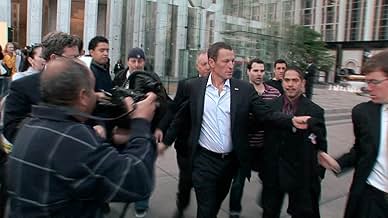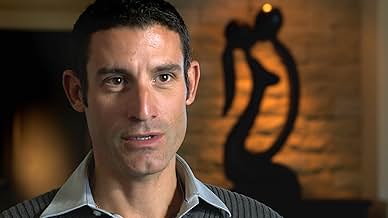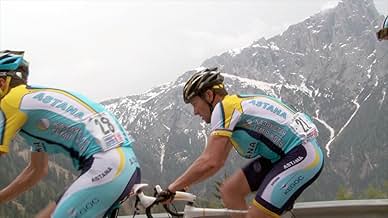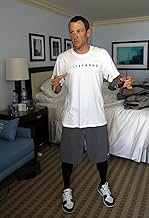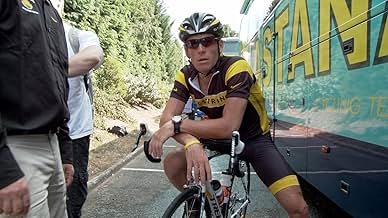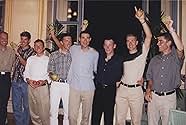NOTE IMDb
7,2/10
8,2 k
MA NOTE
Ajouter une intrigue dans votre langueA documentary chronicling sports legend Lance Armstrong's improbable rise and ultimate fall from grace.A documentary chronicling sports legend Lance Armstrong's improbable rise and ultimate fall from grace.A documentary chronicling sports legend Lance Armstrong's improbable rise and ultimate fall from grace.
- Réalisation
- Scénario
- Casting principal
- Nomination aux 1 BAFTA Award
- 2 victoires et 8 nominations au total
Michael Bloomberg
- Self - NYC Mayor
- (images d'archives)
Bill Clinton Jr.
- Self - Former US President
- (images d'archives)
Anderson Cooper
- Self - Interviewer
- (images d'archives)
Sheryl Crow
- Self - Lance's Girlfriend
- (images d'archives)
Tyler Hamilton
- Self - Teammate
- (images d'archives)
Avis à la une
I always admire the commitment of a documentarian. It feels destined for Alex Gibney to have been following Lance Armstrong just before the turn of his downfall as all his documentaries need a tinge of controversy before they're just right. A comeback film wouldn't have been as interesting as this. Perhaps it's morbid curiosity of why I'm looking into Lance Armstrong more now that the truth has broken out than when he was heroic cyclist who wasn't held back by a little cancer. What brings a man to do something like this? What was the point? The Armstrong Lie has intimate access to the disgraced icon and it's undeniable that he's compelling to watch, if sometimes repulsive. Above all, it reveals the nature of our celebrity worship culture and the power it feeds and the lives it destroys.
The documentary covers all aspects of the sport of cycling. It's quite infectious with its cinematic style and I regret watching this the day that the Tour de France was close to me but I missed it. The film gives scattered information about the basics but there's great insight into how the cheating works. The cutting makes the human drama thrilling as people try to beat Armstrong at his game. The film doesn't necessarily take a side, but he still makes you sick to your stomach when he lies through his teeth to the camera. I couldn't help but keep thinking that Ben Foster will be perfect for Stephen Frears' upcoming film. We still haven't got all the facts, especially about Armstrong's peers, and there's quite a bit about media manipulation here too which the film is a part of, but the story of a contemporary legend falling touches an aching nerve.
8/10
The documentary covers all aspects of the sport of cycling. It's quite infectious with its cinematic style and I regret watching this the day that the Tour de France was close to me but I missed it. The film gives scattered information about the basics but there's great insight into how the cheating works. The cutting makes the human drama thrilling as people try to beat Armstrong at his game. The film doesn't necessarily take a side, but he still makes you sick to your stomach when he lies through his teeth to the camera. I couldn't help but keep thinking that Ben Foster will be perfect for Stephen Frears' upcoming film. We still haven't got all the facts, especially about Armstrong's peers, and there's quite a bit about media manipulation here too which the film is a part of, but the story of a contemporary legend falling touches an aching nerve.
8/10
This documentary in some way attempts to apologize for the sordid life of lies the Lance Armstrong used to ruin a one time popular sport.
There is little detail in this mockumentry that shows the horrible person, megalomaniac, narcissist and criminal that Armstrong was-and still is. Anyone who tries to blame his criminal actions on 'competitiveness' is sorely misinformed.
The only difference between Armstrong and Bernie Madoff is the fact that Bernie took it like a man and put himself in prison for what he did to so many people-who, unfortunately,were just as greedy as he was.
Armstrong compiled a 120 million dollar fortune based on lies to everyone and cheated so many out of greed-and nothing else but pure greed. While this video ends at a point that the real story has just began-I hope that it shows people just what a monster greed really is.
The video at times seems to go out of it's way to portray Armstrong as a patriot, cancer survivor and boy next door type that got 'caught up' in the sport. Nothing is further from the truth. His zest for riches continues, even today, as he is still blaming everyone for his downfall.
As far as presentation the video is quite good and, without a doubt, it is an interesting story of a heathen bent on destroying any one who might revel his lies-all in the name of the mighty dollar.
Threading peoples lives daily, blackmail, corruption and the worst of all what he did to America overall. The flag is stained with his lies forever and how he stays out of prison I will never understand.
An interesting video that I think most can enjoy, if for nothing else, exposing other greedy criminals like Armstrong-whose ego was so inflated-that he considered himself a solitary la cosa nostra.
Today, when so many sports stars are good people, he continues to the blame game.
Again, a fine interesting video.
There is little detail in this mockumentry that shows the horrible person, megalomaniac, narcissist and criminal that Armstrong was-and still is. Anyone who tries to blame his criminal actions on 'competitiveness' is sorely misinformed.
The only difference between Armstrong and Bernie Madoff is the fact that Bernie took it like a man and put himself in prison for what he did to so many people-who, unfortunately,were just as greedy as he was.
Armstrong compiled a 120 million dollar fortune based on lies to everyone and cheated so many out of greed-and nothing else but pure greed. While this video ends at a point that the real story has just began-I hope that it shows people just what a monster greed really is.
The video at times seems to go out of it's way to portray Armstrong as a patriot, cancer survivor and boy next door type that got 'caught up' in the sport. Nothing is further from the truth. His zest for riches continues, even today, as he is still blaming everyone for his downfall.
As far as presentation the video is quite good and, without a doubt, it is an interesting story of a heathen bent on destroying any one who might revel his lies-all in the name of the mighty dollar.
Threading peoples lives daily, blackmail, corruption and the worst of all what he did to America overall. The flag is stained with his lies forever and how he stays out of prison I will never understand.
An interesting video that I think most can enjoy, if for nothing else, exposing other greedy criminals like Armstrong-whose ego was so inflated-that he considered himself a solitary la cosa nostra.
Today, when so many sports stars are good people, he continues to the blame game.
Again, a fine interesting video.
To judge something in terms of how it's executed is all well and good but in a documentary such as this the message takes precedence. It seeks the truth and all the arguments aren't displayed for that to emerge. If it it simply allowed the viewer to make up his own mind then that would be o.k but the film displays a bias thereby becoming a vehicle and a misleading one at that.
The fact that doping was prevalent in cycling and still plays a large factor is obvious. If Armstrong was racing on a level playing field of dopers then that to me would also have been acceptable. However this was far from the case.
Non of Lance's team mates were caught doping whilst they were in his team. Meanwhile all his major competitors were absent from the start line at various points in time due to suspensions and had some key teammates missing from every tour for the same reason. Throughout all the disruptions, devastation, controversy and even a suicide Armstrong was always there with a full strength squad.
The film touches on the importance of team mates and how on all of his wins Armstrong rode alone for only minutes at a time, but fails to take the next step and look at how the various disqualifications imposed on all other teams (apart from his own during his winning years) affected his competitors. Had the film done this Armstrong would never have agreed to be in it because he's still pushing the lie that he won those seven Tours fair and square once we accept as fact that they were all doping.
The UCI had invested in him and were being invested in by a lot of the same sponsors, they allowed many cyclists to burn whilst protecting this man. The film doesn't touch on those aspects and the film maker remains a fan.
I gave the film five stars because it is well shot and well put together. I am a cycling fan and it's view of the race was a pleasure to watch. There is stock footage obviously but the film does follow Armstrong and films the 2009 race independently. The film gives an insight into what it takes to be a professional rider and rider's relationships with one another and their team officials.
Some of the people interviewed I've never seen interviewed i.e doctor Ferrari, which added another point of interest for me.
The 2009 and other pre-'outed' interviews were interesting, giving an insight into Armstrong's mentality at the time and although there is marked contrast to his post-confessional ones it's by no means a transformation and a true repentance. His approach to people seems outwardly very different now, but his attitude towards his legacy and the morality of his actions remain to all intents and purposes unchanged. The exclusions of Paul Kimmage and Greg Lemond from the documentary also indicate this.
I'd say watch the film but bear the other stuff in mind too.
The fact that doping was prevalent in cycling and still plays a large factor is obvious. If Armstrong was racing on a level playing field of dopers then that to me would also have been acceptable. However this was far from the case.
Non of Lance's team mates were caught doping whilst they were in his team. Meanwhile all his major competitors were absent from the start line at various points in time due to suspensions and had some key teammates missing from every tour for the same reason. Throughout all the disruptions, devastation, controversy and even a suicide Armstrong was always there with a full strength squad.
The film touches on the importance of team mates and how on all of his wins Armstrong rode alone for only minutes at a time, but fails to take the next step and look at how the various disqualifications imposed on all other teams (apart from his own during his winning years) affected his competitors. Had the film done this Armstrong would never have agreed to be in it because he's still pushing the lie that he won those seven Tours fair and square once we accept as fact that they were all doping.
The UCI had invested in him and were being invested in by a lot of the same sponsors, they allowed many cyclists to burn whilst protecting this man. The film doesn't touch on those aspects and the film maker remains a fan.
I gave the film five stars because it is well shot and well put together. I am a cycling fan and it's view of the race was a pleasure to watch. There is stock footage obviously but the film does follow Armstrong and films the 2009 race independently. The film gives an insight into what it takes to be a professional rider and rider's relationships with one another and their team officials.
Some of the people interviewed I've never seen interviewed i.e doctor Ferrari, which added another point of interest for me.
The 2009 and other pre-'outed' interviews were interesting, giving an insight into Armstrong's mentality at the time and although there is marked contrast to his post-confessional ones it's by no means a transformation and a true repentance. His approach to people seems outwardly very different now, but his attitude towards his legacy and the morality of his actions remain to all intents and purposes unchanged. The exclusions of Paul Kimmage and Greg Lemond from the documentary also indicate this.
I'd say watch the film but bear the other stuff in mind too.
This movie - and the situation it chronicles - forces us to consider
to what extent we can expect an even playing field - literally - when we watch sports. The athletes say, "Every one else was doing it."
When fans watch NASCAR races, I hope they understand that it's a team sport. The people who built the car, the people who maintain it, the guys who change the tires, the spotters and others contribute as much or more to the win as does the driver. However, when we see an individual athlete - biker, runner, skier, etc. - compete, do we see that the "best man" wins or the performer with the best doctor, the best chemist and research department and the cleverest lawyer to get around the system, as one of the interviewees in this movie suggests.
Should we accept that performance enhancements are now a part of sports, athletes and their supporters will continue to find ways to counter efforts to limit them and accept that? The destructive qualities of steroids - including their potential for violent behavior and the process Armstrong admitted using raise doubt. The drug Amstrong took and the use of blood transfusions to short-cut the body's process for communicating and responding to muscle fatigue surely must be physically destructive. However, I have long had questions about the long-term effects of professional football tackles, questions now being answered, at least in terms of head injuries. Players and fans continue to accept this.
This movie may be more interesting to people who are not cycling fans but is a good exploration of a range of observers and participants.
to what extent we can expect an even playing field - literally - when we watch sports. The athletes say, "Every one else was doing it."
When fans watch NASCAR races, I hope they understand that it's a team sport. The people who built the car, the people who maintain it, the guys who change the tires, the spotters and others contribute as much or more to the win as does the driver. However, when we see an individual athlete - biker, runner, skier, etc. - compete, do we see that the "best man" wins or the performer with the best doctor, the best chemist and research department and the cleverest lawyer to get around the system, as one of the interviewees in this movie suggests.
Should we accept that performance enhancements are now a part of sports, athletes and their supporters will continue to find ways to counter efforts to limit them and accept that? The destructive qualities of steroids - including their potential for violent behavior and the process Armstrong admitted using raise doubt. The drug Amstrong took and the use of blood transfusions to short-cut the body's process for communicating and responding to muscle fatigue surely must be physically destructive. However, I have long had questions about the long-term effects of professional football tackles, questions now being answered, at least in terms of head injuries. Players and fans continue to accept this.
This movie may be more interesting to people who are not cycling fans but is a good exploration of a range of observers and participants.
THE ARMSTRONG LIE is a fascinating documentary. Shot over a period of four years, it purports to investigate the oft-repeated claim that cyclist Lance Armstrong was a cheat, and that every single one of his Tour de France wins were achieved by taking drugs. Alex Gibney's narrative begins as a defense of Armstrong's behavior, but as different elements of the truth emerge, so the filmmaker has to keep readjusting his position. Gibney is obviously a fan of Armstrong (as many people still are), but as the seamy details of what the cyclist did in order to win his races gradually emerge, so the filmmaker gradually understands how wrong-headed he has been give his unquestioning support. Armstrong emerges as a thoroughly unsavory character, pathologically unwilling to acknowledge the truth about himself, and always looking to manipulate the media so that he emerges in a positive light. Even his so-called 'confessional' interview with Oprah looks like a deliberate attempt to rescue his reputation. As the narrative unfolds, so Gibney gradually comes to understand the truth about his subject, and realizes to his cost that much of the film has unwittingly helped to obfuscate that truth, portraying Armstrong instead as a man more sinned against than sinning. It is only right at the end that Gibney admits the truth of Armstrong's motives, and how Armstrong himself has deliberately duped the filmmaker. As a result THE ARMSTRONG LIE is a film that is more about media manipulation than anything else, revealing just how persuasive - and dangerous - a person Armstrong actually is. There's no guarantee that he might not manage to clear his reputation in the future, despite what he has done.
Le saviez-vous
- AnecdotesFilmmaker Alex Gibney followed Lance Armstrong for four years with the intent of chronicling his return to cycling after retirement as Armstrong tried to win his eighth Tour de France. Unexpectedly, Gibney was also there when Armstrong admitted to doping, which resulted in the film being retitled from "The Road Back" to "The Armstrong Lie."
- Citations
Lance Armstrong: I viewed my battle with cancer as an athletic competition. But in that, you either win or you lose. When you lose, or if you lose, you die. So I took that perspective, which is a little dark, and I put it into everything I've done since then. I like to win. But more than anything, I can't stand the idea of losing, because, to me, that equals death.
- ConnexionsFeatured in At the Movies: Venice Film Festival 2013 (2013)
Meilleurs choix
Connectez-vous pour évaluer et suivre la liste de favoris afin de recevoir des recommandations personnalisées
- How long is The Armstrong Lie?Alimenté par Alexa
Détails
Box-office
- Montant brut aux États-Unis et au Canada
- 383 294 $US
- Week-end de sortie aux États-Unis et au Canada
- 28 992 $US
- 10 nov. 2013
- Montant brut mondial
- 594 394 $US
- Durée
- 2h 4min(124 min)
- Couleur
- Mixage
Contribuer à cette page
Suggérer une modification ou ajouter du contenu manquant







